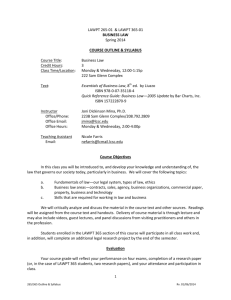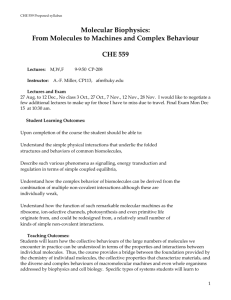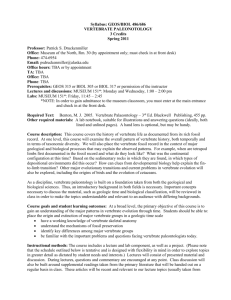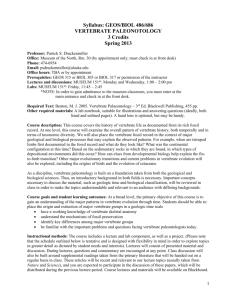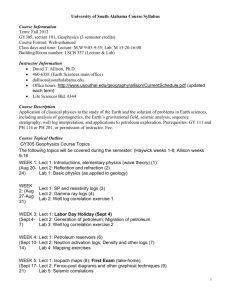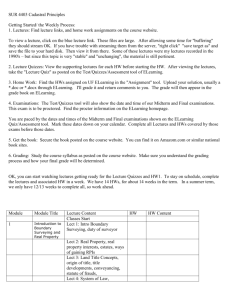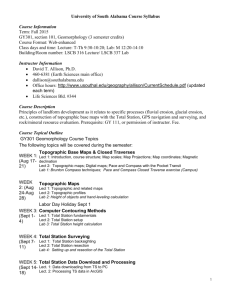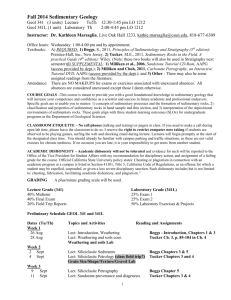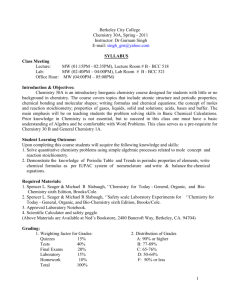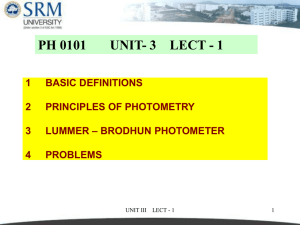Syllabus
advertisement
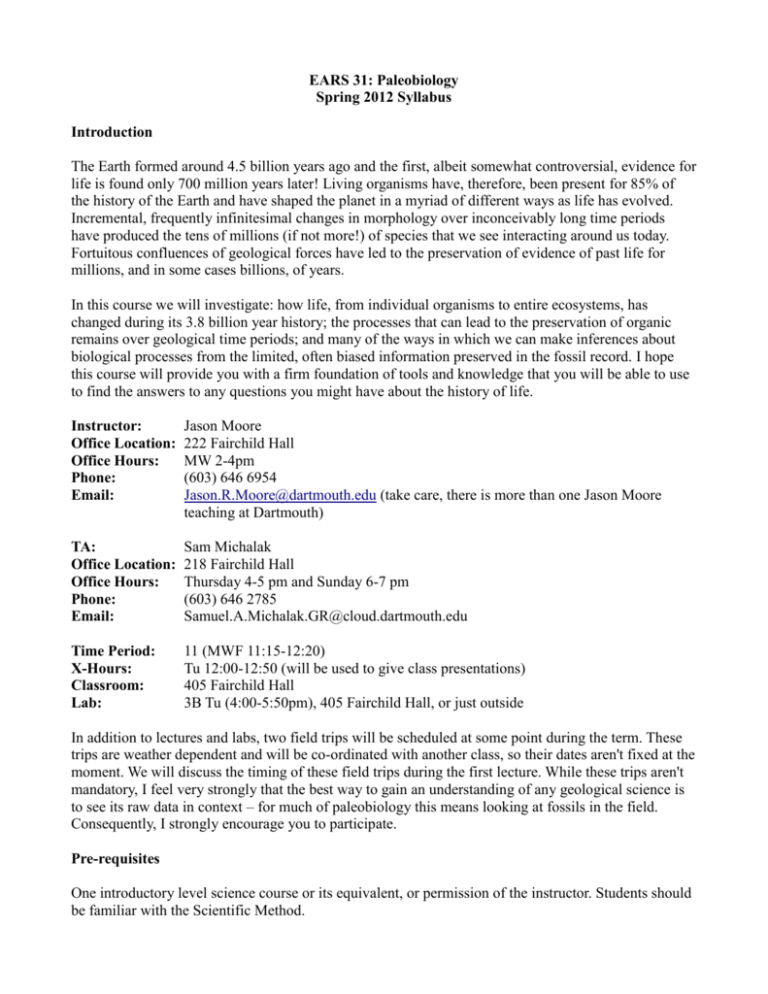
EARS 31: Paleobiology Spring 2012 Syllabus Introduction The Earth formed around 4.5 billion years ago and the first, albeit somewhat controversial, evidence for life is found only 700 million years later! Living organisms have, therefore, been present for 85% of the history of the Earth and have shaped the planet in a myriad of different ways as life has evolved. Incremental, frequently infinitesimal changes in morphology over inconceivably long time periods have produced the tens of millions (if not more!) of species that we see interacting around us today. Fortuitous confluences of geological forces have led to the preservation of evidence of past life for millions, and in some cases billions, of years. In this course we will investigate: how life, from individual organisms to entire ecosystems, has changed during its 3.8 billion year history; the processes that can lead to the preservation of organic remains over geological time periods; and many of the ways in which we can make inferences about biological processes from the limited, often biased information preserved in the fossil record. I hope this course will provide you with a firm foundation of tools and knowledge that you will be able to use to find the answers to any questions you might have about the history of life. Instructor: Office Location: Office Hours: Phone: Email: Jason Moore 222 Fairchild Hall MW 2-4pm (603) 646 6954 Jason.R.Moore@dartmouth.edu (take care, there is more than one Jason Moore teaching at Dartmouth) TA: Office Location: Office Hours: Phone: Email: Sam Michalak 218 Fairchild Hall Thursday 4-5 pm and Sunday 6-7 pm (603) 646 2785 Samuel.A.Michalak.GR@cloud.dartmouth.edu Time Period: X-Hours: Classroom: Lab: 11 (MWF 11:15-12:20) Tu 12:00-12:50 (will be used to give class presentations) 405 Fairchild Hall 3B Tu (4:00-5:50pm), 405 Fairchild Hall, or just outside In addition to lectures and labs, two field trips will be scheduled at some point during the term. These trips are weather dependent and will be co-ordinated with another class, so their dates aren't fixed at the moment. We will discuss the timing of these field trips during the first lecture. While these trips aren't mandatory, I feel very strongly that the best way to gain an understanding of any geological science is to see its raw data in context – for much of paleobiology this means looking at fossils in the field. Consequently, I strongly encourage you to participate. Pre-requisites One introductory level science course or its equivalent, or permission of the instructor. Students should be familiar with the Scientific Method. Textbook Introduction to Paleobiology and the Fossil Record, 1st Edition Michael J. Benton and David A. T. Harper, 2009, Wiley-Blackwell Press ISBN: 978-1-4051-4157-4 $79.95 (Softcover) This text is required for the course. Many paleontology courses spend a large amount of time cataloguing the variety of life through geological time. I think that it is more important, and more interesting, to learn about the processes that have shaped this variety, the utility of paleontology as a geological and biological science and the impacts that living organisms have on their environment. Consequently I am going to assign readings from this book to build a familiarity with the many groups of organisms that we will discuss and build advanced concepts on that knowledge during lecture and lab periods. There is a companion website for this textbook at www.blackwellpublishing.com/paleobiology. I will post any additional material on Blackboard as and when it is needed. Course Format The course will be a mix of lectures, labs, presentations and field trips. Getting through 3.8 billion years of the history of life in one term is a pretty daunting prospect, so I'll be moving through topics pretty fast. I will try to put as much material online as possible, so you can review it at your leisure. Being able to ask questions is one of the most important skills that a scientist can have, so I encourage you to raise a hand and ask a question of me, or of your fellow students, if anything seems unclear. I may ask for your thoughts at some points during lectures. This is a way for me to make sure that I'm being successful in getting my point across and to use as a starting point for further discussion. I am interested in your thoughts and opinions, not the perceived “correct” answer – there may not even be one! As a side note, prepare yourselves to deal with British English spellings and pronunciations. Please speak if any translation is necessary. Expectations Any course you take comes with a set of expectations regarding its conduct. I feel that it helps to lay these out prior to the course. As the instructor, you can expect me to: Design and present a course to introduce you to paleobiology in the most thorough manner possible in the time available. Provide timely, candid feedback about your work. Work with you to ensure that you understand all of the concepts that I am presenting to you. Respect and value your contributions to the class. Listen to any questions or concerns that you might have and work to resolve them. As students, I will expect you to: Complete all the assignments that I set to the best of your ability in a timely manner. Actively participate in class and respect the participation of everyone else. Raise any concerns you may have at the earliest opportunity so that they can be dealt with as quickly and easily as possible. Inform me of absences as soon as you know of them. Refrain from using mobile phones or the internet during classes. I will trial the use of laptops to take notes, but may decide against this if it becomes too distracting. Grading Your final grade will be based on your performance in five different areas, weighted as below: Class presentations: 15% Written exercises: 20% Lab exercises: 20% Mid-term exam : 20% Final exam: 25% During the X-hour each week, groups of students will give short presentations in styles of their choosing summarizing the key features and events relating to different groups of organisms. The number of individual presentations that you will give will depend on the number of students enrolled in the class, but will be at least two. We may not end up using all of the X-hours, depending on the number of students in each presenting group. I will drop the mark from the lowest graded of your presentations when calculating your final score in this category. There will be a minimum of five written assignments given during the course of the class. These will be due at 5pm, one week after they are assigned. I will drop the mark from the lowest graded of your submitted written assignments when calculating your final score in this category. Assignments that are late without prior consent will be docked 30% followed by an additional 2.5% per hour late. Each lab will have a series of exercises associated with it. These will be due at 5pm the day prior to the next lab. I will drop the mark from the lowest graded of your submitted lab assignments when calculating your final score in this category. Assignments that are late without prior consent will be docked 30% followed by an additional 2.5% per hour late. Exams will be a mix of short answer questions, long answer questions and calculations. It is difficult to provide a “hard and fast” list of grading criteria, but the list below should provide a general overview of how I will assign letter grades (consider this an extension of the information in the ORC - http://www.dartmouth.edu/~reg/courses/grade_descriptions.html): A: Superlative work. Shows a thorough grasp of all of the presented material, plus significant additional insight from beyond the scope of the class. Synthesizes concepts and points of view from multiple different sources and critically evaluates each. Raises interesting, well argued points that I had not considered. The work is clearly articulated and well presented. Arguments are logical and well developed. Shows excellent creativity throughout. B: Shows a thorough grasp of all of the presented material with some additional insight brought from beyond the scope of the class. Synthesizes concepts and points of view from different sources, but the range of sources, number of sources or nature of the evaluation of the material is inadequate. Raises points that I had not considered, although these are not thoroughly developed/inconsistent. The work is clearly articulated and well presented. Arguments are logical and well developed. Good creativity is common. C: Shows a thorough grasp of all of the presented material, although additional insight is lacking. Presents one argument strongly, but consideration of other points of view is minimal or absent. The work is clearly articulated and well presented. Arguments are logical, but could be developed further. D: Grasp of the presented material is lacking. Arguments are poorly presented and flawed in part. Work is poorly presented. E: No grasp of the presented material. Arguments are seriously flawed. Major issues with presentation and clarity. I should note at this point that my previous teaching has been in the British system, where grading is slightly different from the US system. I'll do my best to accommodate this difference up front, but be prepared for some unintentional differences. I will ensure that your final submitted grades are directly comparable with other courses at Dartmouth. If you have any grading-related concerns, please come to discuss them with me at the earliest opportunity. Academic Honor The academic honor principle is an important part of your Dartmouth education. Students are expected to follow the academic honor principle in respect of all aspects of this course. If you have any concerns that an action might breach the academic honor principle, please feel free to discuss it with me. The academic honor principle can be found in Organizations, Regulations, Courses and online (http://www.dartmouth.edu/~reg/regulations/undergrad/acad-honor.html). Specific guidance relating to plagiarism and the citing of sources can be found online (http://www.dartmouth.edu/~writing/sources/). Students are expected to collaborate as part of their class presentations (all collaborators should be noted) but the remainder of the graded work (written and lab exercises, exams) should be entirely their own unless I specifically state otherwise. Student Needs Students with disabilities enrolled in this course and who may need disability-related classroom accommodations are encouraged to make an appointment to see me before the end of the second week of the term. All discussions will remain confidential, although the Student Accessibility Services office may be consulted to discuss appropriate implementation of any accommodation requested. Some students may wish to take part in religious observances that occur during this academic term. If you have a religious observance that conflicts with your participation in the course, please meet with me before the end of the second week of the term to discuss appropriate accommodations. Course Schedule This is the schedule for the 2012 course. Note that class presentation topics/dates may change slightly depending on course enrollment. As with all courses, depending on the pace at which we cover material and your interest in different topics, lecture timing is somewhat flexible. Date Class th 26 March Lect Topic The origin of life! th 27 March X-Hour A brief introduction to microorganisms 27th March Lab What is a fossil? 28th March Lect Evolution: Life will find a way 30th March Lect On the origin of species: Are you the same species as your parents? 2nd April Oxygene: Geobiological Interactions Lect rd X-Hour Library Resources: Jane Quigley rd 3 April Lab R: A Palaeontological Toolbox 4th April Lect Animals!: The evolution of the metazoa 6th April Lect Evo Devo and the Cambrian Explosion 9th April Lect Up, up and away!: The Great Ordovician Biodiversification Event (take 1) 10th April X-Hour Class presentations 1 and 2 (Protists and basal metazoans) 3 April th 10 April Lab Adventures in cladistics: Evolution of the Caminalcules 11th April Lect Up, up and away!: The Great Ordovician Biodiversification Event (take 2) 13th April Lect Reef Madness: On coral reefs and colonialism 16th April Lect Land Ho!: Making the transition to a terrestrial environment (take 1) 17th April X-Hour Class presentations 3 and 4 (Lophophorates) th Lab Tracks and Traces th 18 April Lect Late to the party: Making the transition to a terrestrial environment (take 2) 20th April Lect An apple a day: The evolution of herbivory 23rd April Lect Taphonomy or: How I Learned to Stop Believing Palaeoecologists and Love Quantitative Analyses (take 1) 24th April X-Hour Class presentations 5 and 6 (Molluscs) 24th April Lab Bivalves: From seafood to living organisms! 25th April Lect Taphonomy or: How I Learned to Stop Believing Palaeoecologists and Love 17 April Quantitative Analyses (take 2) 27th April Lect Lions and tigers and bears, oh my! The assembly of ancient communities 30th April Lect Mid-Term Exam (part 1) st X-Hour Mid-Term Exam (part 2) st 1 May Lab What information can the loss of information provide us? 2nd May Lect A change can do you good (from a palaeocommunity perspective that is) 4th May Lect Dating isn't all it's cracked up to be: Telling the time in the fossil record 7th May Lect Everything's better in small packages: Microfossils 8th May X-Hour NO CLASS 1 May th 8 May Lab Life's a Beach: Palaeoenvironments from fossil assemblages 9th May Lect CLASS CANCELLED 11th May Lect Class presentations 7 and 8 (Arthropods and Echinoderms) 14th May Lect Viva la Revolución! (Mesozoic Marine and Cretaceous Terrestrial Revolutions) 15th May X-Hour Class presentations 9 and 10 (Chordates) th Lab Palaeobiodiversity and palaeocommunity analysis: The abundance of past life th 16 May Lect Ain't no river wide enough: Dinosaur biogeography 18th May Lect Deep Impact: The end Cretaceous extinction 21st May Lect Mammalian response to climate change – To be or not to be? 22nd May X-Hour Class presentations 11 and 12 (Plants) 22nd May 15 May Lab Extinction rates: When is it normal to go extinct? rd Lect Ecce Homo: The birth of a phenomenon th 25 May Lect The most dangerous animal that ever existed: The sixth extinction 28th May Lect MEMORIAL DAY HOLIDAY – NO CLASS 29th May X-Hour NO CLASS 29th May Lab The diversity of life in 110 minutes 30th May Lect No specific topic: Catching up, review or class discussion 23 May

